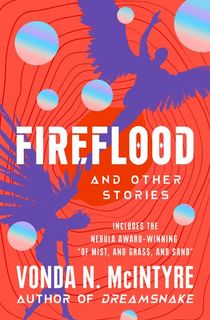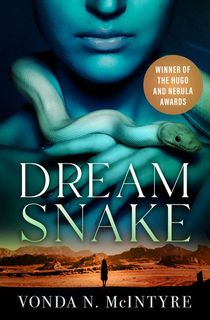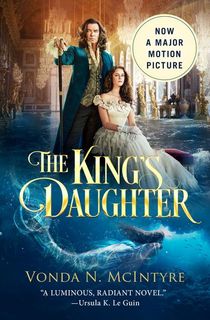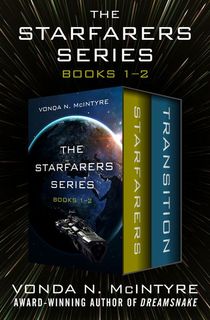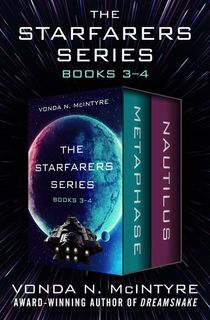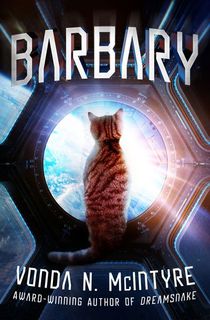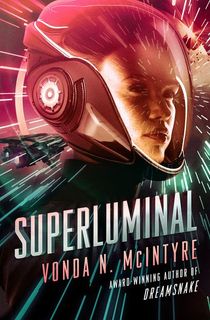The late Vonda N. McIntyre forever changed the sci-fi/fantasy community, on both a large stage and an intimate scale. Aside from being the Hugo and Nebula award-winning author of Dreamsnake and many other excellent novels, she was the co-founder of Clarion West Writers Workshop, which allows new voices in speculative fiction to be mentored by the likes of Ursula K. Le Guin, Frank Herbert, George R.R. Martin, Octavia E. Butler, and other icons.
McIntyre incubated generations of talent through Clarion West, but she’s also remembered for her smaller-scale contributions to the SFF community.
For instance, McIntyre—a biologist with a soft spot for invertebrates—was known to handcraft sea creatures which she gave to workshop participants to reduce stress. Like the jellyfish and anemones she famously crocheted, McIntyre wove together a family of speculative fiction authors who remember her fondly today.
RELATED: The Clarion West Writers Workshop and Vonda N. McIntyre Sweepstakes

A beaded sea anemone hand-crafted by McIntyre.
Photo Credit: Vonda N. McIntyreOriginally from Louisville, McIntyre was raised in the states and in Europe before her family moved to Seattle in the 1960s. She would remain in the Pacific Northwest for the rest of her life, and developed a fondness for the area’s indigenous wildlife. McIntyre once said of her childhood, “The first thing I remember was an SF novel. So I grew up reading science fiction. And a little girl reading science fiction in the 1950s — you had to twist your brain around a little bit to put yourself in those stories, because you weren't there most of the time. And society all around you was telling you that girls should be this and girls should be that, and if you weren't like that, you really felt like an outsider.”
McIntyre was enthused by both science and science fiction; in 1970, she was awarded a Bachelor of Science in biology from the University of Washington, and eventually pursued a graduate degree in genetics. In her free time, she was an avid Star Trek fan who reportedly wrote her own script for the series after watching the first episode in 1966.
The same year she graduated with her bachelor’s, McIntyre had an experience that would change her life: along with Octavia E. Butler, George Alec Effinger, Glen Cook, and Robert Thurston, she attended the 1970 Clarion Writers Workshop.
Since 1968, the annual six-week workshop had fostered fledgling SFF talent on the campus of Pennsylvania’s Clarion State College. In 1971, one year after her initial Clarion class, McIntyre and Clarion Workshop founder Robin Scott Wilson co-founded an offshoot program: The Clarion West Writers Workshop in Seattle.
McIntyre already had many ties with the Pacific Northwest writing community. She and Oregon-based author Ursula K. Le Guin were close friends who collaborated on chapbooks and Christmas cards.
The pair were also aligned in their thoughts on gender equality. This can be seen in Aurora: Beyond Equality, a 1976 feminist sci-fi anthology co-edited by McIntyre and featuring stories from authors such as Le Guin and Joanna Russ. Everfair author Nisi Shawl has since said that through her feminism, McIntyre “made a difference in what sort of stories were available in the ’70s and ’80s, and in who could reasonably expect to write and sell them.”
At the 1972 Clarion West Writers Workshop, a writing prompt inspired what would later become one of McIntyre’s defining works. Tasked with writing a short story based around the words ‘snake’ and ‘cow,’ she penned 13 pages about a world in which snakes have healing properties. This draft would eventually become her 1973 novelette “Of Mist, and Grass, and Sand,” for which she won her first Nebula Award. The novelette would later be expanded into her Hugo Award-winning 1978 novel Dreamsnake, but the standalone novelette can also be read in her short fiction anthology Fireflood.
Speaking to io9/Gizmodo in 2010 about Dreamsnake, McIntyre explained, “when I was writing the book, you know, it was the 1970s and the modern feminist movement was just gaining steam. And there was a lot of controversy in science fiction about whether women should have anything to do with science fiction at all, which I actually found quite hurtful. And I didn't want to do the same thing that everybody else had done for the last 50 years.”
RELATED: What Is New Wave Science Fiction?
McIntyre also wrote speculative fiction that defied genre. For instance, her 1997 alternate history novel The Moon and the Sun (which has since been republished under the title The King’s Daughter) follows a woman in the Versailles court who learns to communicate with an imprisoned “mermaid”—an intelligent sea creature whose life force is supposedly the secret to immortality.
McIntyre also fulfilled her dream of writing Star Trek. She penned numerous Star Trek novels, and is even credited with devising the full name of George Takei’s character, Hikaru Sulu. She wasn’t confined to the Star Trek fandom, either; 1994 saw the publication of her Star Wars Expanded Universe novel The Crystal Star.
From 1989 to 1994 McIntyre published her Starfarers series, a saga about an alien contact team on an unprecedented voyage. The novels explore themes such as science versus militarism, and feature a character representative of McIntyre’s love of invertebrates: the squidmoth Nemo.
All the while, McIntyre continued to inspire up-and-coming writers. Shawl, a graduate of Clarion West’s 1992 class, has said “[McIntyre] was one of the women who made me think I could write science fiction. She was instrumental in theorizing about birth control and sexual consent in the future, and she grounded her feminist concerns in scientific realities. That was amazing.”
In 2008, McIntyre founded Book View Cafe, a publishing co-op that Shawl says boasts “decidedly feminist members.” The online cooperative, which is still active today, was created with the aim of getting authors’ work directly into the hands of readers. Its motto reads, “You can never have too many ebooks.”
McIntyre remained active in the SFF community as an author and as a mentor until her death. Some of her biggest contributions occurred behind the scenes. In 2016, McIntyre began making anonymous donations to the organization Writing the Other, which was founded around the book of the same name by Clarion West alums Nisi Shawl and Cynthia Ward and is dedicated to giving authors tools to “combat cultural toxicity and create narratives that represent and reflect the world.”
Clarion West alum and Writing the Other administrator K. Tempest Bradford explained in 2019, “When [Vonda] offered to pay for a registration in our [Writing the Other] classes, she did so unprompted. She was part of a conversation on Facebook where I talked about balancing the affordability of our classes with our need to make a living. I had never considered asking others to help out with this, and then Vonda just did it. In doing so she opened up the possibility to me that other people would be willing to contribute as well.”
In 2019, at just 70 years old, McIntyre was diagnosed with metastatic pancreatic cancer and given a prognosis of two months to live. She threw herself into edits on her current work in progress, the novel Curve of the World.
Shawl described how McIntyre was surrounded in the last days of her life by the threads of community she had knitted together for decades: “Eight weeks is not much time to prepare yourself for a friend, colleague and mentor’s death, either, but McIntyre’s various communities rallied ’round. Neighbor Jane Hawkins put a series of schedules together: first for escorts for McIntyre’s shopping expeditions, then for the solitary running of her errands, and finally for a round-the-clock bedside watch. Each schedule sparked jealous competition for available slots.”

Vonda N. McIntyre
Photo Credit: AlchetronOn April 1, 2019, McIntyre passed away at her home in Seattle. She had completed Curve of the World two weeks before. In her review, author Nicola Griffith says Curve of the World, which is not yet in print, perfectly encapsulates its author’s approach to community-building. According to Griffith, the novel depicts ancient Minoan culture, which encourages individuals to “pay attention, communicate, tell the truth (particularly to yourself), and trust-but-verify [others].”
McIntyre continues to support new writers, even in death. In 2019, Clarion West debuted the Vonda N. McIntyre Memorial Scholarship. Writing the Other’s Sentient Squid Scholarship—a nod to Nemo from the Starfarers series—also continues McIntyre’s legacy of ensuring authors can access the necessary tools to write inclusive stories.
McIntyre’s papers are archived at the University of Oregon, and all sales of Remembering Vonda, a collection of tributes, benefits Clarion West Writers Workshop. Any proceeds of sales from her work through Book View Cafe also go towards Clarion West.
McIntyre’s fiction continues to find new readers with the recent digital release of many of her novels, and the first film adaptation of one of her books, The King’s Daughter, arrives January 21, 2022. Clarion West continues to thrive, and has in fact offered a $150 credit to one The Portalist reader to use on a 2022 online class. The 2022 session of Clarion West is scheduled to run from June 19th to July 30th.
Finally, many of the sea creatures McIntyre hand-crafted can be seen at exhibitions of the Crocheted Coral Reef Project, a large-scale art and conservation work raising awareness about the beauty of imperiled coral reefs. These artworks remain a testimony to McIntyre’s ability to weave small connections into a powerful and beautiful whole.

Beaded sea creatures hanging in the window of McIntyre's home.
Photo Credit: Vonda N. McIntyreWant more Vonda N. McIntyre? Download her books today!
This post is sponsored by Open Road Media. Thank you for supporting our partners, who make it possible for The Portalist to celebrate the sci-fi and fantasy stories you love.

